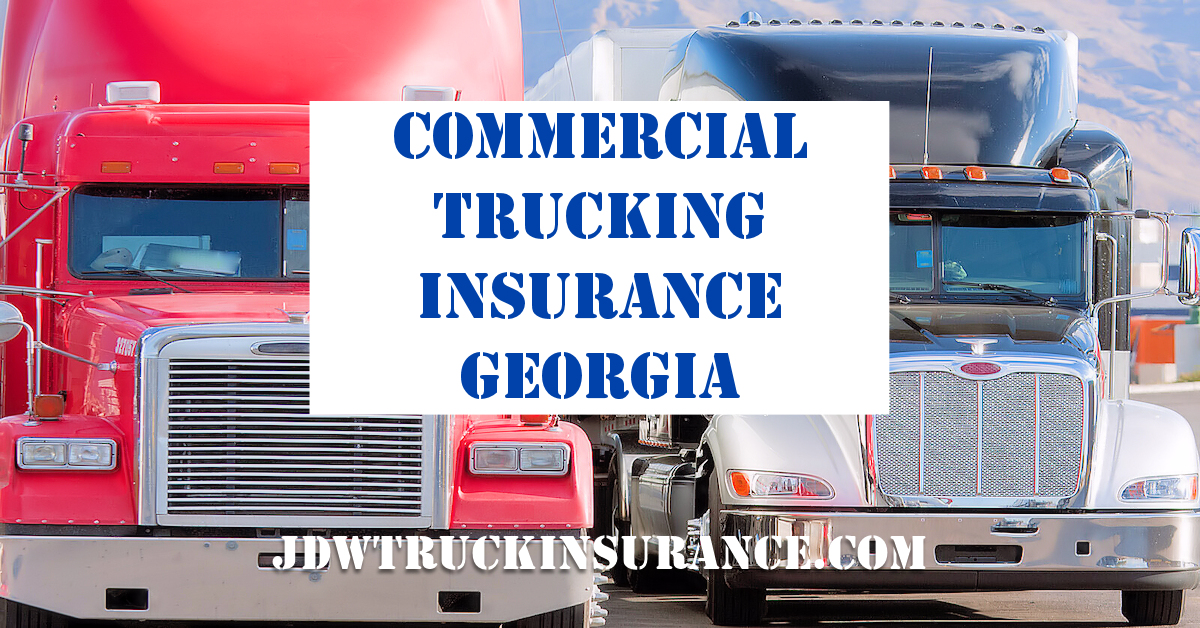Owner Operator Trucking Insurance Suwanee, Georgia
New Authority Truck Insurance Georgia
Commercial truck insurance Georgia. Owner Operator Trucking Insurance Suwanee, Georgia. Affordable commercial truck insurance GA. Top rated commercial truck insurance companies Georgia.
Owner Operator Trucking Insurance Suwanee, Georgia
If you are searching for New Authority Truck Insurance Georgia. JDW Truckers Insurance specializes in New Authority Truck Insurance in Georgia. We help you get affordable commercial insurance rates for your new authority.
We offer quote from only the top rated commercial truck insurance companies who offer the best rates for your new authority in Georgia.
JDW will help get the the correct commercial truck insurance in place which will fit your budget and allow you to haul the cargo you want and need to in order to be successful.
We are here to answer your questions with fast and friendly service.
Owner Operator Trucking Insurance Suwanee, Georgia
We offer affordable new authority trucking insurance for the entire state of Georgia.
We Customize your New Authority Truck Insurance to Help you Save Money!
Our agents at JDW Truckers Insurance know trucking insurance in Georgia. We will explain the different options and commercial truck insurance requirements in Georgia.
We help you get the right coverages in place so you are no over paying for coverages you may not need. We also help you make sure you have the coverages you need in place. And we do this at affordable commercial truck insurance rates.
New Authority Truck Insurance Requirements and Options
General Liability Insurance for Truckers
- General liability insurance for truckers should not be confused with primary liability for truckers.
- Similar to primary liability. General liability offers coverages to pay for physical damage to other and/or bodily injury to others. BUT there is a difference between the two.
- For example, if you are loading or unloading and you cause injury to someone or their property this is when the general liability policy would respond.
- The actions of a driver while representing the insured and on the premises of others, such as loading docks and truck stops
- General Liability is normally offered $1,000,00 per occurrence and $2,000,00 aggregate. What does this mean?
- It the insurance company will pay up to $1,000,000 for any one claim and no more than $2,000,000 per year for the total of all claims.
- General liability can be required by shippers and other companies such as the UIIA and flatbed operations.
- If there is any chance you might be involved in loading or unloading. General Liability is relatively inexpensive and is an advised coverage.
Auto Liability Insurance
- Your Auto Liability or primary liability will be the major cost for your trucking insurance policy. Although the FMCAS can only require $750,000 in most cases shippers will require $1,000,000 in primary liability insurance coverage before they will allow you to pick up loads.
- Primary liability insurance covers damages to third parties for bodily injury and physical damage to others property in the event of an accident.
Medical Pay
- In most cases this is a low cost add on to your primary liability insurance to cover medical expenses.
PIP – Personal Injury Protection
- Some states require this coverage and, in many cases, can reduce the need for Medical Pay.
- Personal injury protection (PIP), also known as no-fault insurance, covers medical expenses and lost wages of you and your passengers if you’re injured in an accident. PIP coverage protects you regardless of who is at fault.
Uninsured Motorist
- If you’re hit by a driver with no insurance…
- Uninsured motorist bodily injury (UMBI) may pay medical bills for both you and your passengers.
- Uninsured motorist property damage (UMPD) may pay for damage to your vehicle.
Underinsured Motorist
- If you’re hit by a driver with not enough insurance…
- Underinsured motorist bodily injury (UIMBI) may pay medical bills for both you and your passengers
- Underinsured motorist property damage (UIMPD) may pay for damage to your vehicle
Motor Truck Cargo
- MTC or Cargo insurance provides insurance on the freight or commodity hauled by a for-hire trucker. It covers your liability for cargo that is lost or damaged due to causes like fire, collision or striking of a load.
- If your load is accidentally dumped on a roadway or waterway, some cargo forms offer Removal Expenses coverage pays for removing debris or extracting pollutants caused by the debris. And can also pay for costs related to preventing further loss to damaged cargo through Sue and Labor Coverage and legal expenses in the defense or settlement of claims. Another option is Earned Freight Coverage to cover freight charges the customer loses because of an undelivered load.
- Cargo insurance deductibles can be set at $1,000, $2,500, $5,00 or even higher if you are self-insured.
- Cargo coverage limits are normally set at $100,00 but some shippers may have higher requirements depending on the cargo you are hauling.
- Cargo policies can have exclusions stating what cargo it will or will not cover.
Trucking Physical Damage Insurance (PD)
- Physical damage insurance coverages are designed to pay for losses to your equipment and damages to others equipment. (Others equipment must be listed on your policy).
- If you own or lease equipment. You may be required to have PD by bank or leasing company to carry a set amount of physical damage insurance and name them as a Loss Payee.
- PD can also cover damage to others equipment you are in possession of if the coverage is listed on your policy. An example would be non-owned trailer insurance coverage.
- Deductibles for physical damage range from $1,000 to $5,000.
- Required deductibles. If you have a loan on your equipment or it is leased. They bank or leasing company may have a minimum deductible you can have on your physical damage policy.
Owner Operator Trucking Insurance Suwanee, Georgia
Chat with JDW Truckers Insurance. We are fast and friendly. Great customer service. Free 24/7 COI.
We offer affordable new authority truck insurance in:
AL – AR – FL – GA – IN – MO – MS – NC – OH – PA – SC – TN – TX – VA
We offer new authority truck insurance quotes for:
- Dry van
- Flatbed
- UIIA
- Amazon
- Reefer and more
Owner Operator Trucking Insurance Suwanee, Georgia
Owner Operator Trucking Insurance Suwanee, Georgia
Suwanee is a city in Gwinnett County and a part of the Atlanta metropolitan area in the U.S. state of Georgia. As of the 2010 census, the population was 15,355; this had grown to an estimated 20,907 as of 2019.
Portions of Forsyth and Fulton counties also have Suwanee and its ZIP Code (30024) as a mailing address.
Suwanee, like most towns in Georgia, started out as a Native American village. It was built on the Chattahoochee River, where societies flourished. The city of Suwanee itself was established and officially recognized by the U.S. government in 1837 upon the erection of a post office. In 1871, the Georgia Air Line Railroad was built through Suwanee, and in 1880 the Rhodes House hotel was built to house passengers of the railroad. This was instrumental in bringing people through the town and helped to generate trade and economic activity. In 1881, a fire burned down all of the buildings on Main Street except for one. From 1880 to 1920, the population saw almost no increase, shifting from 216 people to 241 over the course of 40 years. As of 2015, the population of Suwanee was over 18,000
Beginning in 1933 and ending in 1936, the now heavily traveled Buford Highway was constructed through Suwanee. In 1960, Interstate 85 was built to extend to just south of Suwanee, where it ended at the time. Throughout the last 100 years, several primary education schools have opened in Suwanee, including North Gwinnett High School and Suwanee Elementary School. The first known date for Suwanee High School was 1880, when it was a one-room school house. The first city hall was built in the early 1960s, and the second city hall was built in 1997. In 2005, Town Center was constructed and finished in 2009, at which time the city hall moved to it, where it currently resides. In 2003, Suwanee was named a City of Excellence by the Georgia Municipal Association and Trend Magazine. In 2017, Suwanee was recognized as a Green Community by the Atlanta Regional Commission (ARC) certified at the bronze level for the city’s commitment to environmental stewardship and their leadership in sustainability practices.
Suwanee is located in northern Gwinnett County and southwestern Forsyth County. It is bordered to the northeast by the city of Sugar Hill, to the southwest by the city of Duluth, and on the west by the Chattahoochee River, which serves as the Fulton County border, and across which is the city of Johns Creek.
According to the United States Census Bureau, Suwanee has a total area of 11.0 square miles (28.4 km), of which 10.9 square miles (28.2 km2) is land and 0.1 square miles (0.2 km), or 0.70%, is water.
There are multiple areas with Suwanee postal addresses that are in unincorporated Gwinnett County and in unincorporated Forsyth County; those areas are not in the Suwanee corporate limits.
Suwanee has a humid subtropical climate (Köppen climate classification Cfa), with mild winters and hot, humid summers.
As of the 2020 United States census, there were 20,786 people, 7,012 households, and 5,235 families residing in the city.
As of 2010, Suwanee had a population of 15,355. The racial and ethnic composition of the population was 67.4% white, 10.8% black or African American, 0.1% Native American, 18.0% Asian, 0.1% Pacific Islander, 1.3% reporting some other race, and 2.3% reporting two or more races. 6.75% of the population was Hispanic or Latino of any race.
As of the census of 2000, there were 8,725 people, 2,947 households, and 2,375 families residing in the city. The population density was 889.5 inhabitants per square mile (343.4/km2). There were 3,144 housing units at an average density of 320.5 per square mile (123.7/km). The racial makeup of the city was 84.49% White, 6.38% African American, 0.13% Native American, 6.84% Asian, 0.01% Pacific Islander, 0.72% from other races, and 1.42% from two or more races. Hispanic or Latino of any race were 3.16% of the population.
There were 2,947 households, out of which 46.8% had children under the age of 18 living with them, 71.8% were married couples living together, 6.0% had a female householder with no husband present, and 19.4% were non-families. 14.5% of all households were made up of individuals, and 1.9% had someone living alone who was 65 years of age or older. The average household size was 2.89 and the average family size was 3.23.
In the city, the population was spread out, with 29.5% under the age of 18, 6.1% from 18 to 24, 39.3% from 25 to 44, 20.7% from 45 to 64, and 4.3% who were 65 years of age or older. The median age was 34 years. For every 100 females, there were 102.2 males. For every 100 females age 18 and over, there were 101.8 males.
The median income for a household in the city was $84,038, and the median income for a family was $91,519. Males had a median income of $60,147 versus $40,650 for females. The per capita income for the city was $29,712. About 1.5% of families and 2.2% of the population were below the poverty line, including 1.2% of those under age 18 and 4.4% of those age 65 or over.
Gwinnett County Public Library operates the Suwanee Branch in Suwanee.
Suwanee was the practicing home of the Atlanta Falcons football team from 1979 to 2001.
In 2016, Suwanee unveiled the first Bike Share program in Gwinnett County.
The city of Suwanee has released a master plan of existing and proposed trails and sidewalks to connect the community neighborhoods, schools and businesses. Major trails include:
Suwanee is operated under Gwinnett County Public Schools and primarily served by Collins Hill High School, North Gwinnett High School, and Peachtree Ridge High School. The Philadelphia College of Osteopathic Medicine’s Georgia campus is also located in Suwanee.
The nearest air service is provided by Hartsfield–Jackson Atlanta International Airport, which is south of Atlanta. The nearest regional airport is Gwinnett County Airport.
Choose the Right Agent
When choosing the agent, you want to represent you to the insurance companies. Pick an agent that is trained in commercial truck insurance. And make sure the agent you choose to work with is there when you need them. Our agents are trained in commercial truck insurance and are easy to contact. Email, phone call or text message. We respond quickly to our clients.
Certificate of Insurance
Not being able to get a quick COI could cost you money by not being able to pick up a load for the lack of a COI. Our clients at JDW Truckers Insurance are given access to our COI Portal where they can issue a COI 24/7 free of charge.
Insurance Companies Customer Service
Not only should you choose a responsive agent but you will want to be insured by a commercial insurance company who also responds to your requests and are there to help you in case of a claim or endorsements
AM Best Ratings
The AM Best Rating of the commercial truck insurance company you choose to insure your operation should not be over looked. You want to be insured by a trucking insurance company that has the financial stability to pay claims. Many shippers will require an AM Best Rating of A – minus of better. At JDW all of network of commercial truck insurance companies have an AM Best Rating of A – or better.



